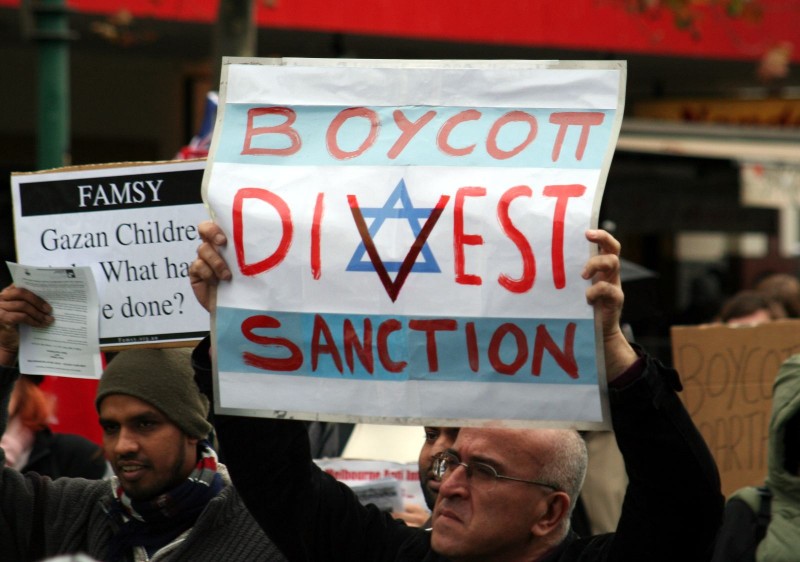Eileen Guinan | Contributing Writer
A petition calling for TCD Students’ Union to hold a long-term policy referendum on joining the Boycott, Divestment, and Sanctions (BDS) movement against Israel is set to be submitted, The University Times has learned.
The BDS movement is an international campaign aimed at applying effective economic, political and social pressure on the Israeli government, in order to encourage them to obey international rulings with regards Palestine.
In response, the Israeli embassy in Dublin has warned TCD students that the move ‘can only serve to be detrimental for TCD as it seeks to promote a itself as a global centre for learning and international cooperation.’
Oisín Vince Coulter, a third year Philosophy and Classics student, and Hist committee member, is spearheading the campaign in Trinity. He believes that the BDS movement, which he notes is gaining both national and international popular support, can have a significant impact on the conflict between Israel and Palestine as ‘Israel relies on economic, cultural and academic links with the west in a manner that makes it vulnerable’.
He hopes to pass a referendum that would result in the SU adapting the BDS movement as part of its long-term strategy. The immediate consequence of the success of said referendum would be a ban on the sale of products manufactured or produced in Israel, by the SU. Going
forward, it would result in continual lobbying efforts by the SU to encourage Trinity to adapt an academic boycott of Israeli institutions.
Coulter identifies the latter consequence as the one of greater importance. This is owing to clear links he makes with regard the technology developed between Trinity academics
and Israeli companies, that is used in the manufacturing of drones that are often responsible for the death of Palestinian civilians.
At the time of writing, 160 signatures of a necessary 250 have been collected. If the required amount is obtained, the electoral commission of the SU will call a referendum.
Should this be achieved, voting will take place within 3-5 weeks of the referendum being announced. In order for the BDS to become a long-term policy of the SU, the referendum would have to garner support from at least of 60% of voters.
If a referendum to join the BDS movement was passed, TCD students would follow the students of NUI Galway in mandating their Student Union to actively participate in BDS.
Recent Irish efforts to support the movement have included the boycotting of the use of Israeli products by The Exchequer Bar in Dublin. This is in addition to the high profile, collective boycotting of the sale of Israeli products by various restaurants, retail outlets and pharmacies, in the village of Kinvara in Galway.
When contacted, the Ireland Palestine Solidarity Group (IPSC), who advocate for the BDS campaign in Ireland, offered their support to a possible referendum in Trinity, stating that ‘the IPSC supports any move by students or staff in any university in support of Palestinian civil society’.
When questioned about the level of interest his petitioning generated among the student body, Coulter said it was ‘significant’. He cited a low number of refusals, a lack of heated response to his teams efforts, and general sympathy with the plight of the Palestinian people as proof of this. He does however acknowledge that there tends to be a lacking of knowledge among the student population in relation to Trinity’s involvement with the conflict, yet a thirst for greater information.
Furthermore the pro-BDS in Trinity effort, draws on links between the boycotting of South Africa by the SU and Trinity itself in the 1970s/1980s in relation to apartheid, and the Israeli-Palestinian situation. Their argument reflects national and international cries that the Israel-Palestine issue is just as serious as South African apartheid and thus the same methods of boycotting should be used.
The Israeli embassy vehemently disagrees with the idea of Trinity joining the BDS movement arguing that it “can only serve to be detrimental for TCD as it seeks to promote a itself as a global centre for learning and international cooperation.”
They cite a recent scientific conference between Trinity and the Weizmann Institute (Israel) where Nobel Prize winners and hundreds of Irish and Israeli scientists discussed research relating to inflammatory diseases and cancer. They relayed the message that if the BDS referendum were to succeed “groundbreaking cooperation in the medical sphere would be a thing of the past”
With under 100 signatures left to collect, students may have to start considering if they agree with the IPSC stance that ‘when governments refuse to act civil society must’ or whether, as the Israeli embassy would argue ‘academic boycotts violate the spirit of academic freedom’.







